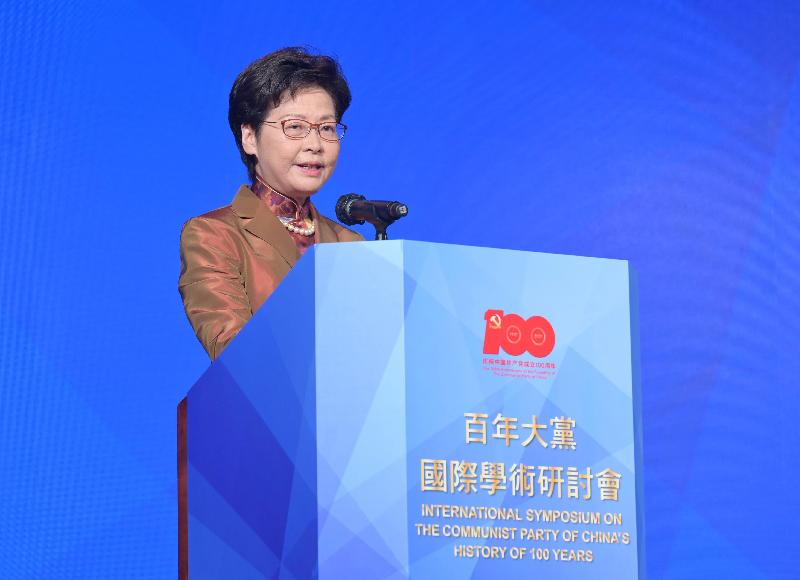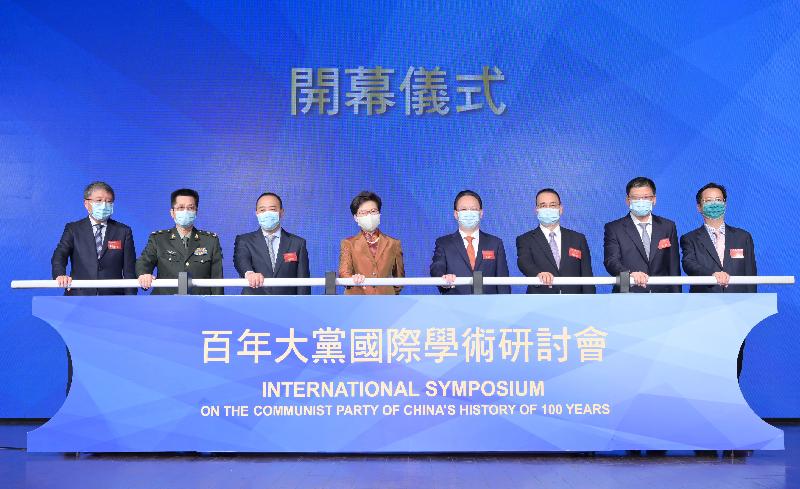Following is the speech by the Chief Executive, Mrs Carrie Lam, at the International Symposium on the Communist Party of China's History of 100 Years today (June 16):
Mr Mao (Chairman of Bauhinia Culture Group Co Ltd, Mr Mao Chaofeng), Deputy Director Tan (Deputy Director of the Liaison Office of the Central People's Government in the Hong Kong Special Administrative Region (HKSAR) Mr Tan Tieniu), Commissioner Liu (Commissioner of the Ministry of Foreign Affairs in the HKSAR, Mr Liu Guangyuan), Major General Cai (Political Commissar of the Chinese People's Liberation Army Hong Kong Garrison, Major General Cai Yongzhong), distinguished speakers and guests, ladies and gentlemen,
Good morning. It is a great pleasure to join you for today's seminar. My thanks to Bauhinia Magazine for organising this event, putting a timely spotlight on the Communist Party of China which will shortly celebrate the 100th anniversary of its founding. I particularly welcome this English-speaking event as the ideology and success of this largest governing party in the world should be told globally, clear and loud.
The Communist Party of China took root with its first National Congress in Shanghai in 1921. The 13 delegates in attendance on that historic day represented less than 60 members. Today, the Communist Party of China is the longest-ruling Communist Party in history and the largest ruling party in the world, counting a membership of over 90 million people.
The Party's longevity is a clear reflection of its unprecedented success, its boundless ability to reach out and respond to the needs and the ambitions of the people of China. I am not about to cover the historic and continuing achievements and singular advantages of the Party in 10 minutes, or 10 days. This welcome seminar, and the expert speakers gathered today, will certainly make a start on that. But let me touch on just a few highlights to capture something of the weight, the worth, the remarkable scope and significance of the Party to our nation.
Let's first look at the economic performance, for it very much reflects a country's level of development and, more importantly, the living standard of its people. After overcoming an initial difficult period, China has made unparalleled economic progress, especially over the past 40 or so years since its reform and opening up began in 1978. Over the past 40 years, China averaged annual GDP growth of over 9 per cent, at constant prices. Over the same period, the world economy grew less than 3 per cent. China today is already the pre-eminent engine driving the global economy. Last year, China's GDP grew 2.3 per cent, the only major economy to realise positive growth in the year of the pandemic. It is expected that China will contribute more than one third of global economic growth in 2021.
China's economy surged past Germany's in 2007, and Japan's three years later, taking its proud place as the world's second-largest economy. At the same time, China is now the largest industrial manufacturer, largest goods trader and largest foreign exchange reserve holder.
Chinese people's livelihood has improved significantly. Its gross domestic product per capita rose from merely about US$200 in 1978 to over US$10,000 today. Even more remarkably, over the past four decades, China has lifted 850 million people out of poverty. At the end of 2020, it eliminated extreme poverty. That, ladies and gentlemen, is a signal achievement for a nation that today counts 20 per cent of the world's population. More than a Chinese milestone, its eradication serves as a landmark in human history. It demonstrates that our country, and the Communist Party of China as its ruling party, always puts its people first.
This "people first" principle has also been clearly demonstrated in our country's fight against COVID-19. As pointed out by General Secretary and President Xi Jinping, "… we must put people and their lives first. The battle with COVID-19 is one for the people and by the people. What has happened proves that to completely defeat the virus, we must put people's lives and health front and centre, demonstrate a great sense of political responsibility and courage, and make extraordinary responses to an extraordinary challenge. No effort must be spared to attend every case, save every patient, and truly respect the value and dignity of every human life."
He is true to his word. Like all countries in the world, China has been hard hit by COVID-19, with the virus costing thousands of lives, challenging the health system, and calling a halt to social and economic activities. In the face of this unprecedented challenge, the Communist Party of China has shown great leadership and determination and taken resolute actions to combat the pandemic. The results are there for all to see. The number of infections has been minimised, and China is the first major economy in the world to put the pandemic under control and allow normality to very much resume.
China's actions are not only for the benefits of its own people, but also for the world. The stringent actions taken by China at the early stage of the pandemic have bought valuable time for the world to make preparations. China has also mounted a massive global humanitarian operation during the pandemic, providing free vaccines and medical supplies to developing countries in need.
The nation's response to COVID-19, as well as its many achievements over the past decades, speak of the unique advantages enjoyed by the country under the ruling of the Communist Party of China. Such unique advantages include extraordinary capability in organisation and mobilisation, in planning and co-ordination, as well as in implementation.
Under the leadership of the Communist Party of China, China managed to make quick decisions and mobilise all forces in the fight against the pandemic. Medical teams and equipment from different provinces were swiftly gathered to provide support to places suffering from outbreaks. People from all walks of life proactively joined the fight and made their contributions. Medical staff in public hospitals worked days and nights to care for the patients, while grass-roots organisations and personnel provided support to tens of thousands of people during lockdowns. Perhaps the most impressive of all, large-scale temporary hospitals were put up within days to care for the patients. During the outbreak in Wuhan, the Huoshenshan Hospital and Leishenshan Hospital were put up in 10 and 12 days respectively.
The unique advantages of China are also clear in infrastructure construction. China's first high-speed railway, the Beijing-Tianjin line, opened in 2008. By the end of 2020, China's high-speed railway tracks already stretched for 38 000 kilometres, doubling the figure in just five years' time. No other nation in the world can claim a domestic railway of such size or significance. This is what people called "the speed of China", made possible under the leadership of the Communist Party of China.
As an inseparable part of China, the Hong Kong Special Administrative Region has benefited hugely from the country. The country provides a safe haven for Hong Kong in times of turmoil, and giving us a shot in the arm when needed. For example, it has rendered support for Hong Kong to ride out and overcome the serious threats to our financial stability posed by the 1997 Asian financial crisis, the life and health risks and economic recession caused by the 2003 SARS outbreak, the negative impact of the 2008 global financial tsunami, and more recently, the COVID-19 pandemic. In addition, the country always embraces Hong Kong in its overall development, as evident by the important roles given to Hong Kong in major national strategies such as the Belt and Road Initiative, the Guangdong-Hong Kong-Macao Greater Bay Area development, as well as in the recently approved 14th Five-year Plan of the nation.
But the most important of all, the Central Government and the Communist Party of China have always been committed to the thorough implementation of the great concept of "One Country, Two Systems". Put forth by Mr Deng Xiaoping, the great concept not only successfully resolved the issues left over by history, making it possible for Hong Kong to return to the embrace of our motherland, but also ensured the prosperity and stability of Hong Kong. Over the past two years when Hong Kong faced unprecedented challenges, the Central Government and the Communist Party of China have stayed true to the original intention of "One Country, Two Systems", and always acted in accordance with the Constitution and the Basic Law. The implementation of the national security law since June 30 last year has effectively restored stability in the Hong Kong society, while the recent improvement to the electoral system of the Hong Kong Special Administrative Region will ensure "patriots administering Hong Kong". These two key initiatives fully demonstrate the Central Government's and the Communist Party's unwavering determination in upholding "One Country, Two Systems", and they will go a long way towards ensuring the long-term prosperity and stability of Hong Kong.
Ladies and gentlemen, history has told us that the Communist Party of China has been able to lead the country to overcome difficulties and challenges, bring prosperity to the country and improve people's livelihood. As our country continues to make strides towards the Chinese dream of national rejuvenation, there will be more challenges in the future, but they, too, will be overwhelmingly met, managed and surmounted by the Communist Party of China, and the people of China.
Now that Hong Kong has been put back on its right course under the Party's declared institutional strength of "One Country, Two Systems", we should make our contribution to the Chinese dream by embracing patriotism, national pride, team spirit and hard work and putting people's interest first.
I wish this seminar every success.
Thank you.
Follow this news feed: East Asia







